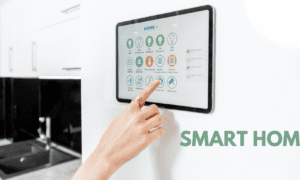As anyone who has ever wrestled with a temperamental home security system or a finicky garage door opener knows, managing your home can be frustrating and time-consuming. But what if there was a way to automate all of those tasks, from controlling the lights and temperature to unlocking the doors and monitoring your security system? That’s where home automation comes in.
Home automation is the idea of connecting your home systems to a central hub, where you can control and monitor them from your phone, tablet, or computer. For example, with the right automation system in place, you can set up a “scene” that will turn on the lights and open the garage door when you arrive home, cool down the house before bedtime, or lock all of your doors before heading off to work. A few simple taps on your phone can make all of this happen, and you don’t have to be at home to do it.
But while home automation may sound like a dream come true, there are a few things to consider before jumping in. First, understanding the pros and cons of home automation can help you decide if it’s the right choice for your lifestyle.
Pros of Home Automation
One of the biggest advantages of home automation is that it simplifies common tasks and makes managing your home easier. With a few simple commands, you can control almost every aspect of your home from wherever you are. You can also set up your automation system on a timer, so you never have to worry about coming home to a dark house or leaving the garage door open. Additionally, automated systems are often more secure than manual ones and provide an extra layer of protection against unwanted visitors.
Regarding security, many home automation systems come with motion detectors, cameras, and door sensors that can alert you to suspicious activity. You can monitor your home from anywhere using these devices and take action if needed.
With that being said, if you’re looking to save some money on energy bills, home automation can be a great choice as well. Automated systems are designed with efficiency in mind, allowing you to easily control lights, thermostats, and other appliances using your phone or tablet. This helps reduce waste and conserve energy, which can add up over time.
Cons of Home Automation
One of the drawbacks of home automation is that it can be expensive to set up and maintain. In addition to the initial cost of purchasing the system, you’ll need to factor in installation fees, maintenance costs, and monthly subscriptions for software updates. Additionally, many automated systems require a dedicated network connection or Wi-Fi router, which can further drive up the cost.
Finally, while home automation can be convenient and secure, it also presents a potential security risk if not set up or monitored properly. The right system can help protect your home from intruders, but if it’s not properly maintained or monitored, it could leave you vulnerable.
Must-Haves for Home Automation
Before investing in a home automation system, you’ll want to make sure it offers all the features and functionality you need. Here are some of the must-haves for any good automated home:
Automated lights – Automated lighting systems let you control your lights from anywhere so that you can easily turn them off when you leave the house or set up a schedule to save energy.
CCTV – If you take security seriously, then you’ll want to invest in a CCTV system for your home. This will allow you to monitor your property remotely so that you can always keep an eye out for suspicious activity.
Temperature sensors – Temperature sensors help ensure that your home is always at the perfect temperature and can help save money on energy bills by preventing unnecessary heating or cooling.
Voice control – Voice control is becoming increasingly popular for home automation systems and allows you to quickly access a wide range of features with just the sound of your voice.
Final Thoughts
Home automation can be a great way to simplify everyday tasks and make managing your home more convenient. However, it’s important to understand both the pros and cons before investing in a system. Make sure to research all of your options carefully to find the best fit for your lifestyle and budget. Most importantly, ensure you work with an experienced and reputable installer to ensure your home automation system is installed correctly and provide long-term support if needed. With the right system in place, you can be sure that your home is always secure, comfortable, and energy efficient.



































